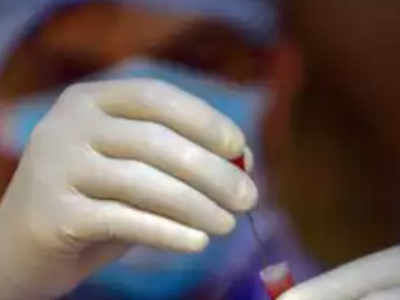- News
- City News
- noida News
- West Uttar Pradesh’s 1st genome sequencing lab to open at GIMS
West Uttar Pradesh’s 1st genome sequencing lab to open at GIMS

Representative image
GREATER NOIDA: The Government Institute of Medical Sciences (GIMS) in Greater Noida will set up the first genome sequencing laboratory in western UP to study variants of the coronavirus. The state government has sanctioned Rs 2 crore for the facility that is likely to become operational by October this year.
According to officials, the tendering process to get equipment for the laboratory will start this month. Currently, samples from NCR cities are sent to the Institute of Genomics and Integrative Biology (IGIB) in Delhi for genome sequencing. Uttar Pradesh has two such laboratories, one at King George’s Medical College and University (KGMU) and the other at the Central Drug Research Institute (CDRI), both in Lucknow.
“The state government has cleared Rs 2 crore for setting up the lab at GIMS. It will be the first such facility in NCR and western UP. The state has two genome sequencing labs and CDRI, Lucknow, is a central government institute. The GIMS lab will have modern equipment. The two facilities in the state have old equipment and can handle a limited number of samples. We will start the tendering process for the GIMS lab in seven-10 days and we expect it to become operational by October this year,” said Brigadier (rtd) Dr RK Gupta, director, GIMS.
Currently samples from GIMS, that caters to Gautam Budh Nagar, Ghaziabad, Hapur, and Saharanpur among other places are sent to IGIB in Delhi, which is an Institute of Council of Scientific and Industrial Research (CSIR).
Usually, reports take about two months. Once the GIMS lab becomes operational, test results can be available within seven to 12 days.
Dr Vivek Gupta, an associate professor in the pathology department and also the in-charge of molecular diagnostics and research laboratory, GIMS, said: “The lab at KGMU has a 16 capillary sequencer, which is an older model. We will have the next generation sequencing machine and around 100 samples can be tested at the lab at one go.”
Genome sequencing helps identify what type of variant of the coronavirus a patient has. In June, GIMS had sent 199 samples from Gautam Budh Nagar, Ghaziabad, Hapur and Saharanpur and other places to IGIB in Delhi for genome sequencing. Of those 137 samples were found to have the Delta variant. While 59 of these samples were from Ghaziabad, 56 were from Hapur and 23 were from Gautam Budh Nagar district. Delta plus variant was not found in these samples, officials said.
According to officials, the tendering process to get equipment for the laboratory will start this month. Currently, samples from NCR cities are sent to the Institute of Genomics and Integrative Biology (IGIB) in Delhi for genome sequencing. Uttar Pradesh has two such laboratories, one at King George’s Medical College and University (KGMU) and the other at the Central Drug Research Institute (CDRI), both in Lucknow.
“The state government has cleared Rs 2 crore for setting up the lab at GIMS. It will be the first such facility in NCR and western UP. The state has two genome sequencing labs and CDRI, Lucknow, is a central government institute. The GIMS lab will have modern equipment. The two facilities in the state have old equipment and can handle a limited number of samples. We will start the tendering process for the GIMS lab in seven-10 days and we expect it to become operational by October this year,” said Brigadier (rtd) Dr RK Gupta, director, GIMS.
Currently samples from GIMS, that caters to Gautam Budh Nagar, Ghaziabad, Hapur, and Saharanpur among other places are sent to IGIB in Delhi, which is an Institute of Council of Scientific and Industrial Research (CSIR).
Usually, reports take about two months. Once the GIMS lab becomes operational, test results can be available within seven to 12 days.
Dr Vivek Gupta, an associate professor in the pathology department and also the in-charge of molecular diagnostics and research laboratory, GIMS, said: “The lab at KGMU has a 16 capillary sequencer, which is an older model. We will have the next generation sequencing machine and around 100 samples can be tested at the lab at one go.”
Genome sequencing helps identify what type of variant of the coronavirus a patient has. In June, GIMS had sent 199 samples from Gautam Budh Nagar, Ghaziabad, Hapur and Saharanpur and other places to IGIB in Delhi for genome sequencing. Of those 137 samples were found to have the Delta variant. While 59 of these samples were from Ghaziabad, 56 were from Hapur and 23 were from Gautam Budh Nagar district. Delta plus variant was not found in these samples, officials said.
FacebookTwitterLinkedinEMail
Start a Conversation
end of article
Quick Links
Delhi Air PollutionDelhi TemperatureChennai WeatherBangalore TemperatureCovid vaccination centres in DelhiCoronavirus in DelhiRTPCR test in GurgaonHyderabad RainPollution level in BangaloreDelhi SmogDelhi TemperatureNoida AQIGurgaon AQI todayFire in MumbaiMumbai RainsCovid 19 RT PCR Test in NoidaDelhi AQI todaySrinagar encounter
